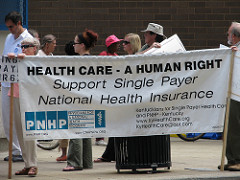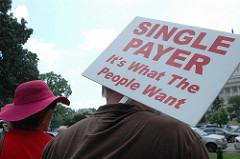 |
 |
 |
 |
 |
By definition, a monopoly is the exclusive possession or control of the supply or trade in a commodity or service.
Is health care a monopoly? You see some competition in some areas even though it isn’t a lot of competition. So, it looks like maybe it’s just an oligopoly. Wrong, but why?
Health care companies all collude with each other. The governing body of the AMA sets the rules for them. Since all the companies follow the same rules and act in unison, it is really almost no different than if one company controlled everything. And, there is actually one organization controlling everything. It’s the AMA. You could argue the point in absolute terms, but in the day to day realistic battles this is where we sit.
Congress takes the advice of the AMA for determining just about everything. How many new doctors should we get? Oh, let’s ask the AMA. Can we build a new hospital? No, we have to get permission first. That was the AMAs idea. Should we make prices transparent? The AMA makes around 80 million per year off their coding system. Surprisingly, in jest, the AMA says no. Congress then says. Hmmm...I think we don’t need transparent pricing or a lot of hospitals. Later that day, congress says, “What we need are ways to make people go to the doctor even less.”
Fixing health care is like asking your senator to vote for term limits. The entire public wants it and yet it never even gets sent to the floor for a vote. Even congress wants to fix health care and yet they are powerless to stand up to the lobbies.
Monopolies are known for two things: High prices and Abuse. Do you remember how the phone companies used to be? You had to rent that old clunky phone for a ridiculous price. How about the cable companies? Is their customer service great? Did you like the way Microsoft was treating companies like Netscape?
One of my favorite doctors didn’t want to join one of the largest health care networks in the country. They told our favorite doctor. Well, if you don’t cooperate with us, we will not allow you to send any patients of yours to the hospital. Well, there was only one hospital in town. So, what choice did the doctor have? He signed up with them even though he didn’t like them. This is their simply strategy to drive up prices.
How about doctors. The health care monopoly sets rules for the doctor. You can see the patient for seven minutes. You can only order this or that test. You must follow our protocols. If not, you’re fired. If you get fired, you will basically have to move far away because the monopoly will have you banned everywhere. Now, you’re in a jam. When they ask you to do something that is illegal like make up stuff to get more bills through the insurance company. Well, you feel forced to do it. A lot of doctors cave into the pressure and few are prosecuted for it. The health company than says, “ We never told them that behavior was ok…However, at the same time they pressure them to perform the behavior in implicit ways.”
In other words, large monopolies feel so confident in their power, they resort to “legal fraud” and all kinds of other employee abuses. It’s because they know that nobody can do anything about it. In return, what kind of service does the patient get? It’s something, but it’s not what the doctor would have ordered in a free market.